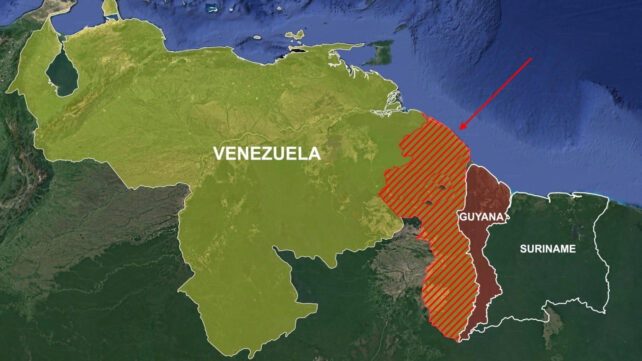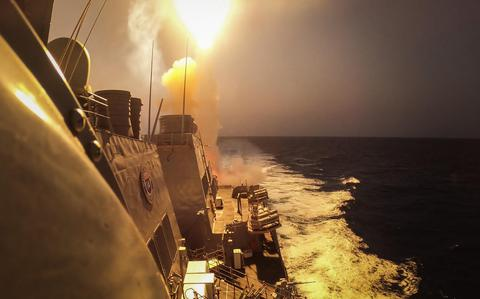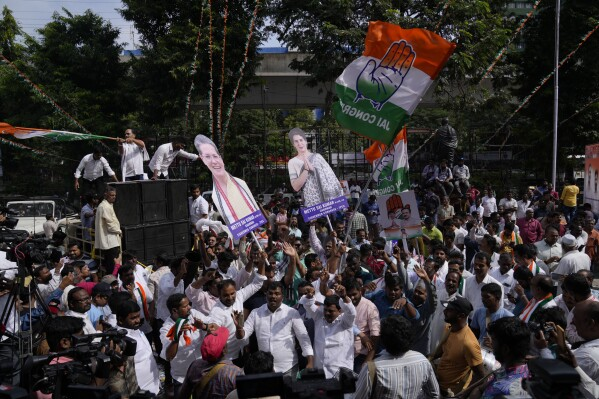
Will Venezuela Annex 2/3 of Guyana?
On Sunday, Venezuelans voted overwhelmingly according to the government in favor of incorporating an oil rich region of neighboring Guyana. The area, named Sky blue makes up some two thirds of Guyana's total territory and has been at the center of a dispute that dates back to the 1800s, but intensified after major discoveries of oil in Guyana's waters from 2015 onwards. The referendum was planned by the Venezuelan government led by President Nicolas Maduro, who pushed hard for Venezuelans to vote yes. The case is currently being considered by the International Court of Justice, after Guyana asked the court to affirm a ruling from 1899 by an international tribunal that set the current boundaries, which Venezuela rejects. One of the questions in the referendum asked Venezuelans if they rejected the ICJ jurisdiction over the dispute, with more than 95% of voters saying they did. The most pressing question was the fifth and final, asking if Venezuelans approved of incorporating the region as a state of Venezuela. Nearly 96% of voters said yes. Guyana had described this question as an existential threat to the country's existence, saying it could pave the way for Venezuela to annex two thirds of Guyanese territory. With the results declared, it's not clear exactly how Venezuela will proceed. The vote has been seen as an attempt by Maduros regime to gauge its own public support ahead of next year's election, while also fomenting irredentist and nationalistic sentiments to boost said support and distract from domestic problems.
Yemen Attacks US Warship
On Sunday, a series of attacks were launched from Houthi controlled parts of Yemen against three commercial vessels in international waters in the Red sea, a shipping artery vital to the global economy. The US military said its USS Carney warship shot down three drones, while two of the shipping vessels were hit by missiles, though there were no casualties. The first ship that came under attack was the Unity Explorer, which the US military described as a Bahamas flagged, UK owned and operated cargo ship with a crew from two nations. The USS Carney detected the incoming attack and shot down an unmanned aerial vehicle in a separate attack. Later that day, the unity Explorer was struck by a missile fired from Houthi held areas in Yemen. And while the USS Carney was responding to the distress call, another inbound drone was detected and successfully shot down. No injuries were reported. Later on Sunday afternoon, another ship called the number nine was struck by a missile with damage but no casualties. The number nine is a Panamanian flagged Bermuda and UK owned and operated ship, according to the US military. An hour later a third ship, the Panamanian flagged Sophie2, reported that it was struck by a missile but did not receive significant damage. While the USS Carney was responding to its distress call an incoming drone was detected and shot down, the Sophie2 was crewed by sailors from eight countries.

A Houthi spokesperson said the Iran backed group had attacked two Israeli ships, though the Israeli military says the ships in question have no connections to Israel. US Central Command said the attacks represent a direct threat to international commerce and maritime security, adding that the US will consider all appropriate responses in full coordination with its international allies and partners. The attacks aren't the first actions by the Yemen based Houthis in the Red sea, who have vowed to target Israel over its war in the Gaza Strip. Houthi militants last month hijacked and seized what they called an Israeli linked to cargo ship in the Red sea, which has since been freed. And they've also previously launched missiles and drones from their territory in the direction of Israel. The Red sea is a vital shipping line, with the Suez Canal at its northern end and the Gulf of Aden at its southern end. It provides a route for oil tankers leaving the Middle East and the many container ships travelling between Asia and Europe.

France Deportation
Moving to Europe now, where the French press has reported the deportation of an Uzbek national suspected of having links to terror organizations in Uzbekistan, in violation of a ruling by the European Court of Human Rights. The 39 year old man was deported from France on November the 14th, despite ECR the ruling against the French government due to a perceived risk of torture upon the man's return to Uzbekistan. The decision came a month after a French schoolteacher was stabbed to death in the northern city of Arras by a former student with a record of Islamist radicalization. French Interior Minister Gerald Darmanin defended the decision, insisting the man was known to the police for his roots in the pro jihadist movement. He had previously spent time in a detention centre in the Paris suburbs. The number of deportations from France has increased by 30% since the Arras attack compared to the rest of the year, according to the French Interior Ministry.

India State Elections
India's ruling BJP party, led by Prime Minister Narendra modi, has emerged victorious in a series of state elections in north and central India, a good sign for Modi's re-election hopes at next year's general election. The BJP won three out of four of the most recent contests. It gained control of Chattisgarh and Rajasthan from the opposition Indian National Congress or INC and maintained control of Madhya Pradesh. Meanwhile, in Telangana, the Inc gained control from a regional party. The BJP victories were in what is considered India's Hindi heartland where Modi and his BJP have very strong appeal thanks to their Hindu nationalist policies. Prime Minister Modi said the results indicate that the people of India are firmly with politics of good governance and development. While the result in Telangana does highlight the BJP's failure to gain ground in southern India. The overall picture is not looking great for the opposition. The Inc seeking to deny Modi a third term in power have united with dozens of smaller opposition parties to form the Indian National Development Inclusive Alliance or India for short. But as things stand Modi's BJP look to be in a good position ahead of next year's vote, which is expected in April or May.